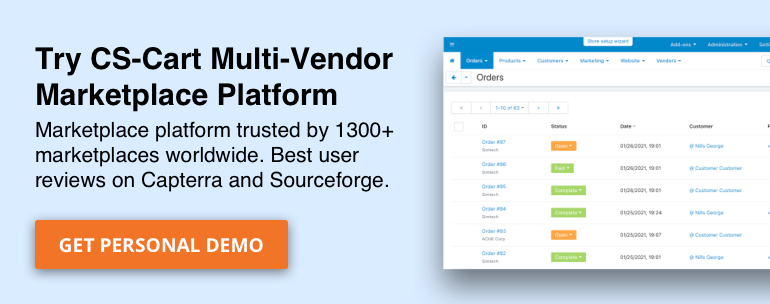6 Benefits of Creating a B2B Online Marketplace

 |
Tom Slipkus is a writer and content strategist who helps B2B companies and agencies develop content around a wide range of topics. He specializes in writing mid and bottom funnel articles that educate and engage audiences, helping increase traffic, get more subscribers and turn readers into loyal customers. |
Are you thinking of starting a B2B online marketplace? If so, you are on the right path to creating a sustainable and profitable business.
According to forecasts, the B2B e-commerce industry in the US will grow to an unprecedented $1.13 trillion by 2020. In addition, statistics say that the global B2B ecommerce market reached $10.6 trillion, which is over five times more than the B2C market.
So, what is the catch and what are some obvious advantages of creating a B2B online marketplace?
Industry Size
Since the B2B industry is much bigger than B2C, it accounts for more sales, which naturally leads to more revenue.
In addition, manufacturers and wholesalers play a significant role in generating this huge market growth. And while these two industries rely on their own systems which tend to slow them down, B2B customers who want a better user experience have started to demand a shift to more modern processes.
This will lead to a big change in how B2B companies sell their products and use technology. Consequently, further market growth is simply inevitable.
More Accurate Statistics

If you choose a powerful B2B ecommerce platform, you can basically streamline and automate a number of processes. In addition, if you combine it with advanced marketing tools, you will also be able to perform a website analysis and get unique insights into the important data that can enhance your sales and marketing operations.
This is especially true if you integrate your B2B ecommerce platform with your ERP system. This way, you will get detailed statistics for every single client, including:
- order totals
- revenue
- profit
- accurate percentages
- discounts within a specific time period
When you collect all this data and if you use it wisely, you will be miles ahead of your competition.
Order Values and Conversion Rates
One of the reasons why B2B is growing so fast and why it has reached twice the size of the B2C market lies in the fact that B2B order values are generally higher. Moreover, B2B buyers tend to make decisions faster.
B2B customers sometimes purchase hundreds or even thousands of items in a single transaction. If you are skeptical, numbers don’t lie. The average B2B transaction order is around $491, which is more than three times higher compared to the B2C industry.
Furthermore, B2B sellers have higher conversion rates—10% as opposed to only 3% for B2C.
The reason for this is very simple. Apart from having more money to spend on purchases than B2C customers, B2B buyers also have more confidence to buy items.
Faster Order Fulfilment
B2B sellers can speed up their order fulfillment process by using advanced ecommerce platforms such as CS-Cart Multi-Vendor.
Ecommerce platforms used to leave sellers with wrong and untimely information, scrambling order processing and tracking inventory. What’s more, the data wasn’t synchronized between systems.
Fortunately, modern ecommerce platforms have advanced order management systems that are either built in or can integrate with other software in a very simple way. Now, sellers are able to synchronize order data across various channels and leverage systems in order to automate order fulfillment and inventory updates.
Moreover, these platforms enable them to handle complex processes such as partial delivery and multi-warehouse shipping.
Lower Operating Costs

Operating costs are a big concern to all businesses. However, B2B online marketplaces are a great opportunity to decrease operating costs.
But how?
Traditionally, wholesalers would have to constantly update and print flyers as well as TV or billboard ads. Now, however, the internet does wonders for businesses that want to market their products.
Running a marketing campaign from your computer is not only cheaper but it also offers great advantages when it comes to the number of customers you can reach.
Apart from that, with more and more interactive ecommerce websites that provide detailed information about product specifications, the need for sales representatives is reducing, which further decreases operating costs.
Customer Service and Feedback
As the retail world is becoming more seamless and efficient, customers’ expectations are only getting higher. As a result, shipping delays and mistakes in entering stock data are not tolerated anymore, so now businesses need to prioritize customer service.
B2B ecommerce platforms provide a seamless process for customers, including all of the following stages:
- ordering
- payment
- confirmation
- shipping
- item tracking
This saves a significant amount of time and provides much better customer service.
It is very simple. If you want your clients to keep coming back for more and thus increase your sales, you need to offer an unparalleled buying experience.
In addition, to keep improving your user experience and CSAT score, make sure to always ask for feedback from your B2B customers. You can conduct a survey or simply ask them to leave a review. This can have an incredible impact on your business as reviews generally produce a significant increase in sales.
More useful eCommerce articles and infographics are coming your way. Follow CS-Cart on Facebook and Twitter not to miss them!

Yan Anderson is the Head of Content Marketing at CS-Cart with over 10 years of experience in the eCommerce industry. He's passionate about explaining complicated things in simple terms. Yan has expertise in building, running and growing eCommerce marketplaces. He loves to educate people about best practices, new technologies, and trends in the global eCommerce industry.

